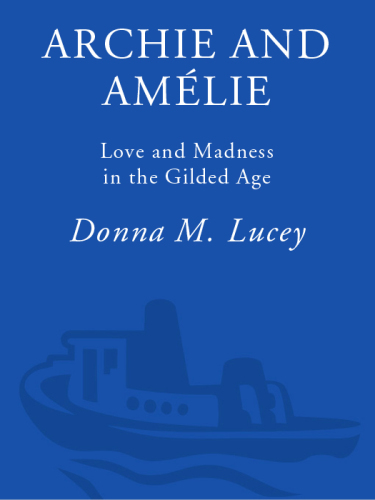
Archie and Amélie
Love and Madness in the Gilded Age
عشق و دیوانگی در عصر طلایی
کتاب های مرتبط
- اطلاعات
- نقد و بررسی
- دیدگاه کاربران
نقد و بررسی

May 1, 2006
A great-great-grandson and heir of John Jacob Astor, John Armstrong "Archie" Chanler was born with the proverbial platinum spoon in his mouth but was no stranger to misfortune. His mother died in 1875 when he was just 13, and his father's demise two years later made Archie the de facto head of the family of 10 orphans. An eccentric who, Lucey concludes, probably suffered from bipolar disorder, Archie married the mesmerizing Amélie Rives, goddaughter of Gen. Robert E. Lee and a Virginia novelist whose scandalous heroines made her a literary sensation. Amélie was a master manipulator and morphine addict who refused her besotted husband sex and affection while spending his inheritance to refurbish her family plantation. The couple's divorce after seven years was fodder for the media as were Archie's commitment to a mental institution by siblings alarmed by his free-spending ways, his escape four years later and his lawsuits to prove his sanity and reclaim his fortune. Writer and photo editor Lucey ably chronicles the pomp and excesses of the Gilded Age, but her book bogs down in exhaustively researched details about a parade of glittering Astors and their retinue. 16 pages of b&w photos not seen by PW
.

July 1, 2006
The forgotten story of Astor heir John Armstrong (Archie) Chanler and novelist Amé lie Rives has all the elements of a garish theatrical production, including imprisonment in and escape from an asylum, and a homicide. Within weeks of the couple's 1888 marriage, Amé lie wrote of the -gloom, grief, and terror - she felt with Archie near. That same year, she published her first work: a novel condemned by polite society as -sensual rot - that nonetheless sold 300,000 copies. Archie, yearning to be as famous as his wife, plunged into the business of philanthropy and the creation of a textile empire. His eccentricities became more pronounced as he dealt with his feelings of isolation and rejection, and his family eventually had him committed. Writer and photo editor Lucey skillfully weaves her voluminous research into an artful tale, sympathetic to both figures. She excerpts passages from Amé lie's novels and Archie's unpublished manuscripts to support her analysis of their psyches. Her writing style is informal and colorful; the portrait she paints of the time period, the events, and the people influencing and influenced by Archie and Amé lie is intriguing. Recommended for public libraries, especially those in the Charlottesville, VA, area." -Kathryn R. Bartelt, Univ. of Evansville Libs., IN"
Copyright 2006 Library Journal, LLC Used with permission.

Starred review from June 1, 2006
Amelie Rives' racy first novel," The Quick or the Dead, " was published in 1888, making her the toast of two continents. In the same year she married John Jacob Astor's spectacularly wealthy but eccentric great-grandson John Armstrong "Archie" Chanler. The marriage was troubled from the start--in fact, it may never have been consummated. Both parties were highly strung, Amelie was addicted to morphine, and Archie didn't like finding himself in the shadow of his brilliant and beautiful wife (nor would he be pleased to find himself just a footnote in today's standard sources on American writers and American women). But even after their headline-making divorce and Amelie's remarriage to an impoverished Russian prince, he continued to throw money her way. Archie's many siblings viewed this as one symptom of insanity and had him committed to an asylum--from which he managed to escape four years later. This is really Archie's book, and he is portrayed with a measure of sympathy, while Amelie comes across as being selfish and manipulative. Lucey's highly readable and substantially documented chronicle is part Victorian melodrama, part Edith Wharton, and part Tennessee Williams. Add this to the nonfiction-that-reads-like-a-novel shelf. (Reprinted with permission of Booklist, copyright 2006, American Library Association.)

























دیدگاه کاربران